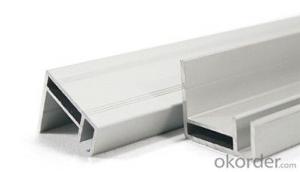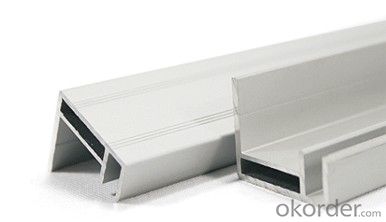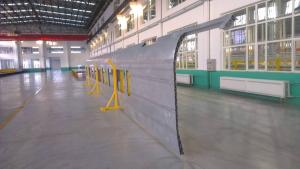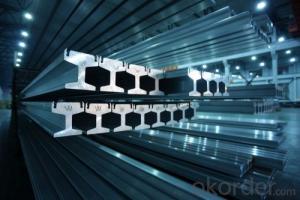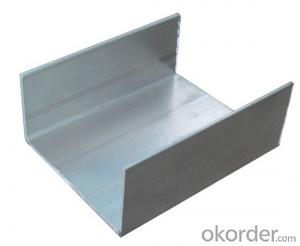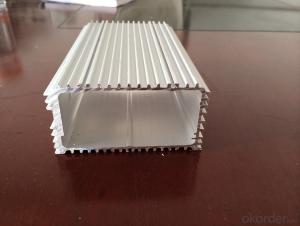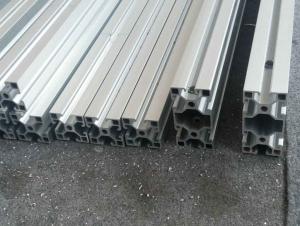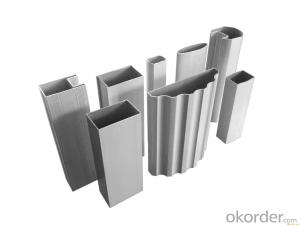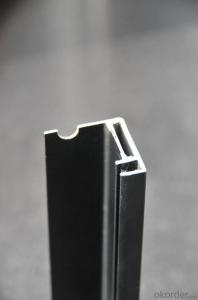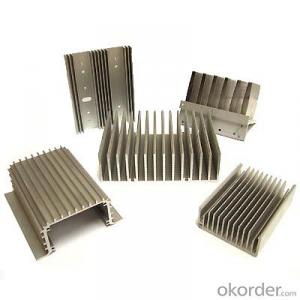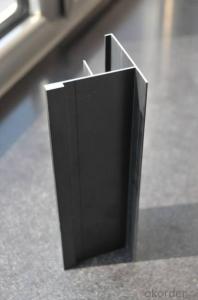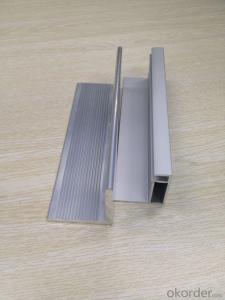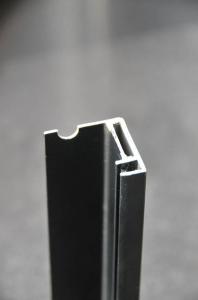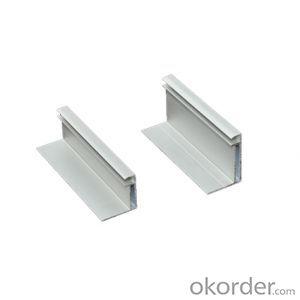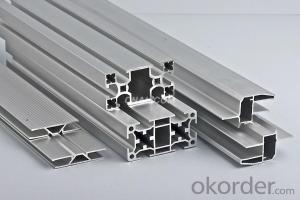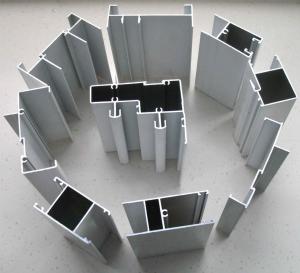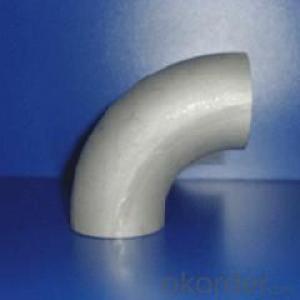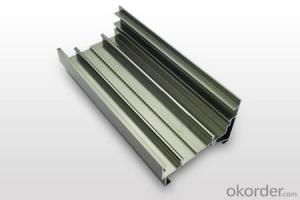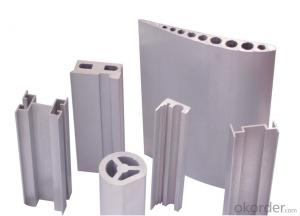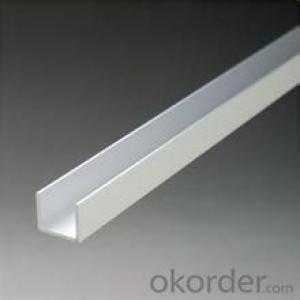Aluminum Strut Profiles Solar Module Aluminum Frame
OKorder Service Pledge
OKorder Financial Service
You Might Also Like
We are the largest aluminum profilemanufacture in
Provide full type of solar module frame:
Size:30x25mm
35x35mm
35x40mm
Other size can be accepted.
Material | Alloy Aluminum 6063,6061,6005,6082 or customer nominated |
Temper | T3, T4, T5, T6 and other |
Surface | Anodize, electrophoresis, powder coating, PVDF coating, wood grain painting, etc. |
Colour | Any colour based on Standard Germany RAL Mark |
Length | Not more than 16 meters |
Good Package | Inner plastic film /outside carton/wooden pallets |
Payment Method | T/T, L/C, etc |
Delivery Time | Normally 2-4 weeks, Delivery time can be consulted. |
Press Machine | 500-12500 tons all together 93 press lines. |
Fabrication | 1. Solar module frame; 2. Drilling; 3. Bending; 4. Cutting; 5. etc. |
Certificate | ISO/TS 16949,DNV,IRIS,CCS,AFA,etc. |
Dies | 1. Using our dies, no fee; |
2. Using customer drawing, opening dies, usually about 5~50 tons then the dies cost can be refunded. | |
3. Die cost is negotiable base on the order quantity | |
Capability | Annual output 800,000 tons |
- Q: What are the standard dimensions and sizes of aluminum profiles?
- The standard dimensions and sizes of aluminum profiles can vary depending on the specific application and industry. However, there are some common dimensions and sizes that are widely used in various industries. In general, aluminum profiles come in various shapes such as angles, channels, tubes, and bars. The dimensions of these profiles typically range from small to large, with sizes measured in terms of width, height, and thickness. For example, aluminum angle profiles commonly have dimensions ranging from 1/2 inch to 8 inches in width and height, with thicknesses ranging from 1/16 inch to 1/2 inch. Aluminum channel profiles can have widths ranging from 1/2 inch to 12 inches, heights ranging from 1/2 inch to 3 inches, and thicknesses ranging from 1/16 inch to 1/4 inch. Aluminum tube profiles often come in various outer diameters, ranging from 1/8 inch to 6 inches, with wall thicknesses ranging from 1/32 inch to 1/4 inch. Aluminum bar profiles typically have widths ranging from 1/8 inch to 12 inches, heights ranging from 1/8 inch to 4 inches, and thicknesses ranging from 1/16 inch to 1/2 inch. It is important to note that these dimensions and sizes are just a general guideline, and specific applications may require custom dimensions or sizes. Additionally, different countries or regions may have their own standards and variations in aluminum profile dimensions and sizes. Therefore, it is always advisable to consult with manufacturers or suppliers to determine the specific dimensions and sizes that meet your requirements.
- Q: Can aluminum profiles be used in solar reflector systems?
- Indeed, aluminum profiles find application in solar reflector systems. The utilization of aluminum in solar reflector systems is widespread owing to its extraordinary corrosion resistance and high reflectivity. The malleability of aluminum profiles allows for effortless customization and shaping, facilitating the optimization of sunlight reflection onto the solar panels. Furthermore, the lightweight and durable nature of aluminum profiles render them highly suitable for outdoor usage. Consequently, aluminum profiles emerge as a prudent and efficient selection for solar reflector systems.
- Q: Shanghai industrial aluminum profile manufacturers which is better?
- For the choice of aluminum profiles, here are a few suggestions for you to refer to:First: very cheap, do not chooseAs follows: the cost of industrial aluminum material = the spot price of aluminum ingot, the processing cost of extrusion aluminum material, the freight of packing material. These are transparent, the cost of aluminum profiles are similar, significantly lower than the market price, the first possibility: the weight per meter less; second: aluminum is the use of recycled materials; third: material loss amplification (not according to the actual sales amount of meters).Second: only understand the sale material supplier does not chooseExplain as follows: preparing goods, recruit a few operator, big online promotion can be opened. Those who are often hurt are our buyers. Miss wiring mostly do not know how to use, only know the unit price. How to use to meet customer needs; how to make the most cost-effective; in different venues that kind of connection is the best; these are they can not answer accurately. Only know the cheapest and recommended profile connection the cheapest; this connection is the lowest cost, but the cost of artificial, a connection is the weakest, aluminum convenience wouldn't be reflected, and will bring much trouble for the future reconstruction. But the wiring girl will push it one way.
- Q: What are the different shapes and profiles available for aluminum profiles?
- There are several different shapes and profiles available for aluminum profiles, each with its own unique characteristics and applications. Some of the most common shapes and profiles include: 1. Square and rectangular profiles: These profiles have straight sides and sharp corners, making them ideal for applications where strength and rigidity are required. They are commonly used in architectural structures, frames, and support systems. 2. T-shape profiles: T-shaped profiles consist of a flange or arm extending perpendicular to a larger base. These profiles are often used for structural applications where additional strength and support are needed, such as in beams and columns. 3. Round profiles: Round profiles have a circular cross-section and are commonly used in applications where a smooth and seamless appearance is desired. They are often utilized in decorative applications, such as handrails, lighting fixtures, and furniture. 4. Angle profiles: Angle profiles have two perpendicular sides, forming a 90-degree angle. These profiles are commonly used for corner protection, edging, and framing applications. They are often seen in construction, manufacturing, and automotive industries. 5. I-beam profiles: I-beam profiles feature a central vertical web with two flanges on either side, creating an "I" shape. These profiles are known for their high strength-to-weight ratio and are often used in structural applications, such as bridges, buildings, and heavy-duty machinery. 6. Custom profiles: In addition to the standard shapes mentioned above, aluminum profiles can also be custom-designed and extruded to meet specific requirements. This allows for endless possibilities in terms of shape, size, and functionality. Overall, the availability of different shapes and profiles for aluminum profiles allows for versatility and adaptability in various industries and applications. Whether you need strength, aesthetics, or a combination of both, there is a suitable aluminum profile shape and profile for your specific needs.
- Q: Can aluminum profiles be anodized for improved corrosion resistance?
- Yes, aluminum profiles can be anodized to enhance their corrosion resistance. Anodizing creates a protective oxide layer on the surface of the aluminum, making it more resistant to corrosion and increasing its durability.
- Q: Are aluminum profiles suitable for gym equipment?
- Yes, aluminum profiles are suitable for gym equipment. Aluminum is a lightweight and durable material that can withstand heavy use and provide excellent structural support. Its strength-to-weight ratio makes it ideal for gym equipment as it allows for easy maneuverability while still maintaining stability and durability. Additionally, aluminum is resistant to corrosion, making it suitable for environments with high humidity or moisture levels, such as gyms or fitness centers. The versatility of aluminum profiles also enables the customization of gym equipment to fit specific needs and requirements. Overall, aluminum profiles offer numerous benefits for gym equipment, making them a suitable choice for fitness facilities.
- Q: Changhe brand aluminum can?
- Profile is not bad, but visibility is not too large, the whole is still very good, cost-effective
- Q: Are aluminum profiles suitable for mass production or large-scale projects?
- Yes, aluminum profiles are highly suitable for mass production and large-scale projects. Aluminum is a lightweight and versatile material that offers excellent strength and durability. Its malleability allows for easy customization and fabrication, making it ideal for creating complex shapes and designs. Additionally, aluminum profiles have excellent corrosion resistance, ensuring longevity in various environmental conditions. Moreover, aluminum is recyclable, making it a sustainable choice for large-scale projects. Therefore, aluminum profiles are a preferred choice for industries such as construction, automotive, aerospace, and manufacturing, where mass production and large-scale projects are common.
- Q: What are the different surface finishing options available for aluminum profiles?
- Aluminum profiles offer a range of surface finishing options, each with its own advantages and visual appeal. Some commonly used options include: 1. Anodizing: By creating a protective oxide layer through an electrochemical process, anodizing enhances corrosion resistance and provides various color choices. Anodized aluminum profiles are long-lasting, easy to maintain, and have a sleek, attractive look. 2. Powder Coating: This method involves applying dry powder to the aluminum profile's surface and then curing it with heat. The result is a durable, decorative finish that resists chipping, scratching, and fading. Powder coating offers a wide range of colors and can be customized for different textures and effects. 3. Polishing: Achieving a high-gloss, reflective appearance, polishing involves using abrasives and compounds to remove imperfections. This mechanical process creates a mirror-like finish, often used for decorative purposes where a shiny look is desired. 4. Brushing: By using abrasive brushes or pads, brushing creates a textured, brushed finish on the aluminum profile. This method produces parallel lines or circular patterns, providing a unique and stylish appearance. Brushed finishes are commonly used in architectural and interior design applications. 5. Electrophoretic Coating: Also known as e-coating, this immersion process involves applying an electrically charged paint to the aluminum profile. This ensures uniform coating thickness and excellent corrosion resistance. E-coating provides a smooth, even finish and is frequently used in automotive and industrial settings. 6. Wood Grain Effect: Aluminum profiles can be treated with a special coating to mimic the appearance of wood grain. This option is popular in architectural applications where the durability and low maintenance of aluminum are preferred over natural wood. These are just a few of the available surface finishing options for aluminum profiles. The choice of method depends on the desired appearance, functionality, and intended application of the profile.
- Q: This question asks for guidance on selecting the appropriate size and shape of aluminum profiles for a specific application.
- <p>Choosing the right size and shape of an aluminum profile involves several steps. First, consider the load-bearing requirements and structural integrity needed for your application. Consult with engineering standards or use software that can simulate the stress and load on the profile. Second, consider the aesthetic and functional requirements, such as the profile's visibility and the need for specific features like slots or holes. Third, review the available profiles from suppliers, matching your needs with their offerings. Finally, prototype with the selected profile to ensure it meets all requirements before full-scale production. Always consult with aluminum profile manufacturers or suppliers for their expertise and recommendations.</p>
Send your message to us
Aluminum Strut Profiles Solar Module Aluminum Frame
OKorder Service Pledge
OKorder Financial Service
Similar products
Hot products
Hot Searches
Related keywords
